- Home
- Naguib Mahfouz
Khan Al-Khalili Page 5
Khan Al-Khalili Read online
Page 5
But in spite of all that he had left a historical record when it came to matters of the heart.
The first instance occurred during his first year in secondary school, which only need bother us for what it shows about his particular temperament. At the time he was a well turned-out and attractive young man, traits he may well have inherited from his parents. He managed to attract the attention of a pretty young Jewish girl who was the daughter of his neighbors. There was a time—it would appear—that Ahmad Akif was actually attractive! She used to play on the same street and would watch from her window for him to come home from school. Her pert femininity was abundantly evident to him and distracted him with the fires of love, and yet it was not enough to arouse in him the necessary courage and daring. His heart may have been aflame, but the only thing his timid nerve would allow him to do was to stare at her in silent longing and then retreat exhausted as soon as she stared back at him. Even though he was so bashful, he did manage to share some passionate moments with her, but it was at her instigation. She was a daring coquette; nothing could hold her back. Her brazen behavior managed to overcome his bashfulness. One afternoon she chased after him and caught up. She called out his name, and he turned round, his face pomegranate-red. She gave him a gentle smile, and he responded with an abashed one of his own.
“Let’s walk down Abbas Street!” she said.
Without uttering a single word he went with her. They walked side by side as the sun headed toward the horizon. She made a point of sidling up and gently rubbing against him. That made him move away; it was as though he were afraid she might think he was the one taking the initiative, whereas in fact he longed to brush against the person alongside him. She now put his right arm through hers, laughing diffidently as she did so. He looked all around him.
“Are you scared?” she asked playfully.
“I’m scared that someone from your household might see us,” was his gentle reply.
“Who cares?” she retorted with a shrug of her shoulders. Seeing how shocked he looked, she went on, “Are you still scared?”
“Yes,” he replied after a little hesitation, “I’m scared someone from my own family might spot us.”
She burst into laughter. With that she took him to a garden. “Now,” she whispered, “we’re out of range of all those spies!”
They walked around in silence as the sun continued its descent and sunset shadows grew longer, erecting a pavilion to welcome the onset of night.
“I had an amazing dream,” this brazen girl now said, trying to work her way round his shyness.
“A nice one, I hope,” he said, beginning to warm to her conversation.
“I dreamed that I met you somewhere. You told me that you wanted.… Then you said a word that I’m not going to tell you. You have to say it. Can you guess?”
That made him feel even more flustered. “I d-d-d-don’t know,” he stuttered.
“Yes, you do,” she replied sweetly, “you’re just pretending! Go on, say it.…”
He swore to her that he really didn’t know.
“There’s no point in lying to me,” she said. “You’d better remember. It’s a word whose first letter is K.…”
He remained silent, heart pounding.
“The second letter is I.…”
He still said nothing and turned away.
“The third letter is S,” she went on. “So what’s the last one?”
He gave her an embarrassed smile, but still had no idea of what to say.
“If you don’t say something,” she said, squeezing his arm, “I’m never going to talk to you again!”
That threat had the desired effect, since he drew another S in the air.
“So now at last you’ve told me what it is you want,” she laughed in delight, “and I’m not going to stop you.” She leaned toward him, totally frustrated by his incredible bashfulness.
He stole a quick kiss that seemed to last for whole decades. How he longed for more of the same! But that is the way he was: intense passions but along with them desperate shyness. This pretty Jewish girl liked to poke fun at his face. He took her seriously and started hating his own face to an unnecessary degree. Now he had yet another excuse for his innate shyness, which only intensified. Had it been possible for a man to wear a veil over his face, he would have been the one to do so. It was one of the key factors in the excessive attention he paid to his personal appearance, something that transformed itself into utter neglect when despair got the better of him.
The pretty Jewess suddenly disappeared from his life. No sooner did a young man from her own community become engaged to her than she abandoned her playful ways and adopted a more serious lifestyle, entirely oblivious to the bloody wound she was leaving behind in a tender heart. But then tender hearts can salve their wounds very quickly. So it happened that in the final phase of his time at secondary school the proximity of neighbors brought him into contact with the pretty and youngest daughter of a widow who was one of his mother’s friends. An affection developed between the two young people, duly encouraged by their two mothers who were soon referring to them as the “bride and groom.” This second relationship was not like the earlier one that had served as a wake-up call to a heart that was now ready for sentimental education. However, this girl by contrast possessed strength of character and determination. As a result, when she fell through his fingers, he regretted it bitterly. Afterward he would often tell himself that if he had followed his and her mother’s advice and married that girl, he would have enjoyed a married life of unparalleled happiness. However, no sooner had he obtained his high school diploma than his family was struck by disaster. His father was pensioned off, and it was now up to him—Ahmad—to face the dire consequences. Cruelly snatched from the gentle havens of hope, he found himself instead cast into the sheer hell of despair. If this girl was willing to stay with him, she would have to wait for at least ten years until his younger brother had completed his education. It became obvious that her mother was not going to encourage such a sacrifice since it would involve a long wait. In fact, it was the girl herself who made the decision to ignore her feelings; she cut off the relationship, and all their dreams came to nought. From then on Ahmad lost all faith in love and women, just as he had already done with the world as a whole. The love that in the presence of the Jewish girl had filled his heart was nothing but a false illusion, a teenage disease just like teething in babies. Harsh reality had imposed its own severe sentence on someone who had decided to rely on a woman’s word; it didn’t matter whether she was like his fiancée when it came to both intelligence and virtue, or whether she was like the Jewish girl who had flirted with him to her heart’s content and then left him, like a guest at a hotel on Station Square leaving his room.
Now twenty years had gone by and his heart was still a void. He continued to endure a life of poverty filled with a variety of concerns that augured little hope for the future. If only he had managed to control his rage, he might have been able to be successful at something. In fact he still nourished a hope—after all, life cannot be without any hope at all, can it?—that one day he might find some happiness. Even though he had eventually despaired of ever gaining any prestige or authority, he could still aspire to be happy.
He tried getting engaged to the daughter of a merchant who lived in Ghamra, but her father rejected his offer in the nicest possible way. The middle-aged Ahmad learned that the girl’s mother had noted that he was of a certain age and yet his salary was small. This blow to his pride left him reeling, and he went into a towering rage. It was more than he could tolerate to be rejected by some woman or other, when he was the genius against whom the entire world was conspiring. What’s more, she had rejected him because he was insignificant! How could anyone say he was insignificant? So who exactly was supposed to be significant? With sparks flashing from his eyes he clenched his fist and vowed dire vengeance on the world. Only yesterday his beloved had rejected him because he was still young and had
few prospects, where today another girl was rejecting him because he was too old and still had no prospects! So when exactly was he supposed to have prospects? Had his life been wasted? All glory was past, happiness was lost, everything was finished; was that it?
Thereafter he developed a habit of criticizing women and accusing them of every kind of shortcoming. They were cunning creatures, using ambition, lies, and sheer stupidity to work their wiles. Soulless bodies, sources of pain for man, and grief for humanity in general. Their superficial interest in science and art was merely a sham they could hide behind whenever victims fell into their clutches. But for the wicked lust implanted in our instincts they would win neither hope nor love. They … they.…
“I’ve made myself a solemn vow, thank God,” he would often tell his friends, “that I’m never going to get married however many chances I may have to do so. I totally refuse to be taken over by some dirty creature with neither mind nor soul!”
If his complete failure to achieve anything turned him into an enemy of the entire world, then his failure with women made him their enemy too. Even so, deep inside him there still lurked rapacious illicit desires and emotions.
The way that a passing girl affected him, as had happened today, stirred up some of those latent feelings and immediately brought to mind his previous experiences with women. It annoyed him, and provoked that profound and familiar sensation that combined love, fear, and hate. In the sheer relish he felt for his self-sacrifice and doing what was necessary he found a certain consolation for all his failed hopes, but this time his anger stubbornly refused to soften. He still felt angry, peevish, and full of hate. After all, anyone who has become used to having sacrificial offerings come to him to be slaughtered is never going to be willing to be the sacrificial lamb himself. He decided to wallow in his own misery and the life of a recluse; as though, after allowing his heartstrings to play sweet melodies, he was now throwing it all down a fetid well where it would languish. He now lived his life without hope, without anyone to love, without a heart, refusing to stay in touch with life or enjoy the pleasures it could offer.
By now he had despaired of ever achieving anything worthwhile. That pushed him into a life of seclusion, while his despair in matters of love drove him to consort with prostitutes. It was as though the negative feelings he had about women in general now threw him into the hands of those wretched and defiled women who would only accentuate the unhealthy sentiments he already had. His malicious attitude now served to convince him that the only genuine women were prostitutes. The veils of deceit regularly used by other women had been ripped away; they no longer felt any need to pretend that they were in love and could remain loyal and pure. However, consorting with prostitutes robbed him of more than his respect for women; it also killed off any vestigial sense he had of his own worthiness as a man. He was convinced that, if a prostitute loved a man, it was only for his natural masculine attributes and had absolutely nothing to do with either social values or relationships through family or neighbors. The Jewish girl may have fallen in love with him because there was no one else around. With his would-be fiancée it had been the fact that they were neighbors and their mothers had encouraged it. But with a prostitute none of those factors were involved when she chose a lover from among the dozens of men who regularly consorted with her. So, if he had not managed to attract a prostitute for such a long time, it must be because he was not sexually attractive. Having reached that conclusion, he could now add sexual incompetence to the ugliness he had been using as an excuse before.
Once his brother Rushdi had finished his college degree in commerce and obtained a job with Bank Misr two years earlier (his other brother had died a while ago), Ahmad genuinely felt that his major task was not merely complete but duly celebrated.
5
After lunch he made his way back to the new quarter. “Second alleyway on the right, then the third door on the left,” he mumbled to himself as he drew closer. As he made his way up the winding staircase, he remembered the young girl he had seen that morning, the one with the lovely olive complexion and honey-colored eyes. Would he see her again, he wondered? What apartment did she live in and on which floor?
By now his mother had organized things in the apartment. He stayed there until sunset, but then decided to wander around the streets of the quarter in order to explore and find out as much as he could. He put his clothes back on and headed outside. He paused for a moment by the apartment entrance and looked around him as he tried to decide in which direction he should start his exploration. But before he had a chance to make up his mind, he was aware of someone coming toward him. Turning round, he spotted the person whom he had identified that morning as Boss Nunu. The man approached him with a heavy tread, beaming with pleasure.
“A hearty welcome to our new neighbor!” the man said, extending a hand as rough as a camel hoof. “What a wonderful day for all of us!”
Ahmad greeted his new neighbor, hardly expecting such a warm welcome from the source of “God damn the world!” “And greetings to you too, Boss!”
The man gestured to a chair in front of his store. “Please join us for a minute,” he went on, the broad smile still on his thick lips. “This is a happy day indeed!”
Ahmad hesitated for a moment. It was not so much that sitting down with the boss would mean negating the purpose of his expedition, but rather that his shyness would never allow him to accept such an invitation without due hesitation.
“I swear by al-Husayn himself,” the boss went on in his usual loud voice, “that, unless you have some really urgent business to attend to, you be my honored guest. Gaber, bring us some tea and a shisha too!”
In spite of his hesitation Ahmad was delighted to accept the boss’s invitation. He went over to a chair, while the boss came back with another. They sat facing each other. The calligraphy store was exactly like all the others in terms of its size and neat appearance. It was covered with beautiful signs, with a table in the middle on which bottles of colored inks, pens, and rulers were arranged. Leaning against one of the pillars was a large sign at the top of which was written in gaudy colors “The Khan Gaafar Grocery Store,” with the name of the owner etched out in pencil but not colored in yet. The boss was wearing a gallabiya, white coat, and skullcap. He was about fifty years old, stocky, and well built. He had a large head with pronounced features, an equally large mouth, and thick lips. His complexion was wheat-colored, with a red tint to it.
“Nunu the Calligrapher, your humble servant,” he said once he had sat down.
“I’m delighted to meet you,” Ahmad replied, raising his hand to his head. “This humble servant is Ahmad Akif, civil servant in the Ministry of Works.”
He had never liked mentioning where he worked as a way of salving his own sense of pride. Every time he had to introduce himself, it was a moment of sheer torture. But this time he did not feel the same way because he was well aware that people like Boss Nunu had great respect for civil servants. The man raised his hand to his head as a token of respect, then gave a gentle smile.
“It would be an honor to welcome you at any time,” the man said with his characteristic bluntness, “but was it really fear of the air raids that brought you here?”
Ahmad was utterly amazed that people already knew why they had left the old quarter when they had only been in the new one for a single night.
“Who told you that?” Ahmad asked, staring disconsolately at the man.
“The driver who brought your furniture,” he replied in all simplicity. “These days everyone’s moving somewhere else.”
That was a cue for Ahmad to launch into a defense of his family’s courage. “Actually,” he said, “all the quarters that have been subjected to the danger of air raids have emptied out. What drove us to leave our old quarter was the fact that my father has a weak heart, and we were worried about it. We really didn’t want to leave.”
At this point the waiter came with the tea and shisha. He put the shisha pipe d
own in front of the boss, then brought a chair from the store, placed it in front of Ahmad, and put the teapot down on it. The boss urged his guest to take some tea, while he himself grabbed the shisha pipe with relish and took a long puff from it, filling his nostrils.
“It’s always okay for people to go looking for security, even though in fact everyone’s life is in God’s hands and fate decides what’s going to happen. Ahmad Effendi, I’m one of those people who places complete reliance on God. I have no idea how to get to the bomb shelter. Which bomb shelter are you talking about, for heaven’s sake? Have you ever listened to the words of Salih Abd al-Hayy’s song? ‘Whatever your share of life may be, that is the way it is!’ Even so I pray to God that He will be a sufficient protection against calamity. At the same time I also pray that our luck may be good. After all, if it weren’t for decisions made by some people, we wouldn’t have the good fortune to be new neighbors, would we?”
Ahmad was aware that what the boss had said at first was intended to poke a bit of fun at him, even though it may not have been malicious. The rest of it obliged him to show some gratitude.
“Thank you, Boss,” he replied with a smile. “Prudent people have often told us that there is security to be found in the al-Husayn quarter.”
The other man took another huge puff and let out a cloud of thick smoke. “That’s true enough,” he said. “It’s a blessed and much loved quarter, much honored because of the person it’s named for. In days to come you’ll realize that from now on you won’t be able either to forget it or do without it. A deep-seated emotion will continually call you back. Here, take a puff from the shisha.”

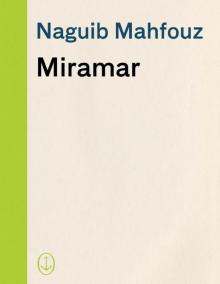 Miramar
Miramar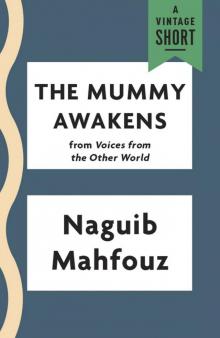 The Mummy Awakens
The Mummy Awakens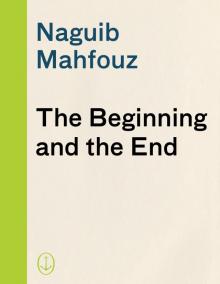 The Beginning and the End
The Beginning and the End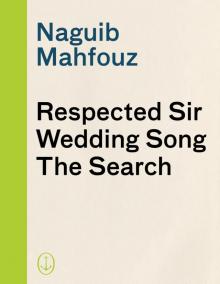 Respected Sir, Wedding Song, the Search
Respected Sir, Wedding Song, the Search The Mirage
The Mirage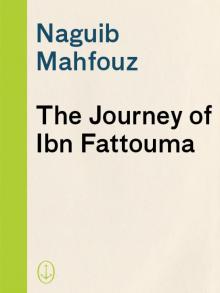 Novels by Naguib Mahfouz
Novels by Naguib Mahfouz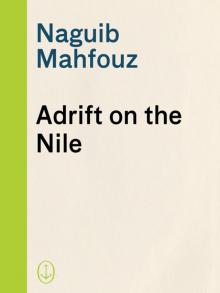 Adrift on the Nile
Adrift on the Nile Karnak Café
Karnak Café Heart of the Night
Heart of the Night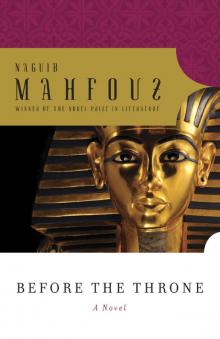 Before the Throne
Before the Throne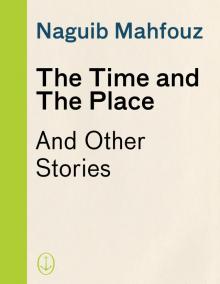 The Time and the Place: And Other Stories
The Time and the Place: And Other Stories Cairo Modern
Cairo Modern Arabian Nights and Days
Arabian Nights and Days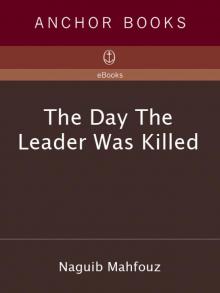 The Day the Leader Was Killed
The Day the Leader Was Killed Morning and Evening Talk
Morning and Evening Talk Three Novels of Ancient Egypt Khufu's Wisdom
Three Novels of Ancient Egypt Khufu's Wisdom Akhenaten: Dweller in Truth
Akhenaten: Dweller in Truth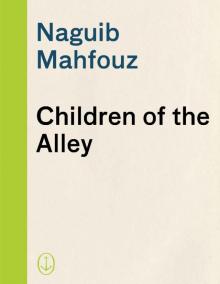 Children of the Alley
Children of the Alley Voices From the Other World
Voices From the Other World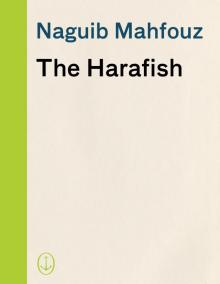 The Harafish
The Harafish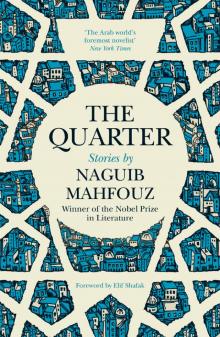 The Quarter
The Quarter The Seventh Heaven: Supernatural Tales
The Seventh Heaven: Supernatural Tales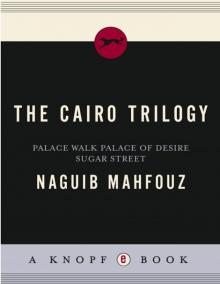 The Cairo Trilogy: Palace Walk, Palace of Desire, Sugar Street
The Cairo Trilogy: Palace Walk, Palace of Desire, Sugar Street Khan Al-Khalili
Khan Al-Khalili Three Novels of Ancient Egypt Khufu's Wisdom, Rhadopis of Nubia, Thebes at War
Three Novels of Ancient Egypt Khufu's Wisdom, Rhadopis of Nubia, Thebes at War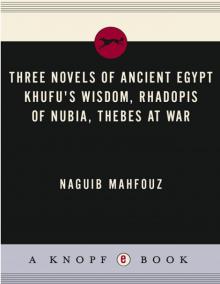 Three Novels of Ancient Egypt
Three Novels of Ancient Egypt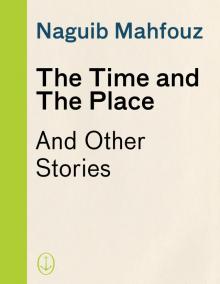 The Time and the Place
The Time and the Place Palace Walk tct-1
Palace Walk tct-1 Akhenaten
Akhenaten The Seventh Heaven
The Seventh Heaven The Thief and the Dogs
The Thief and the Dogs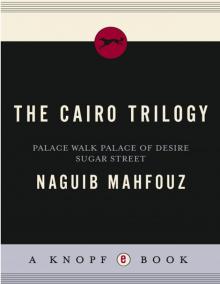 The Cairo Trilogy
The Cairo Trilogy Sugar Street tct-3
Sugar Street tct-3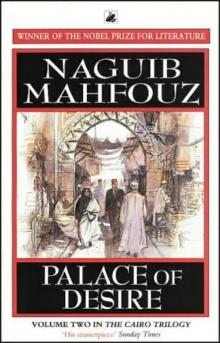 Palace of Desire tct-2
Palace of Desire tct-2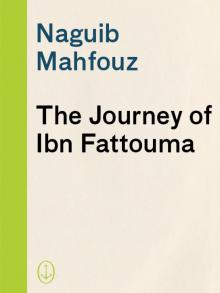 The Journey of Ibn Fattouma
The Journey of Ibn Fattouma